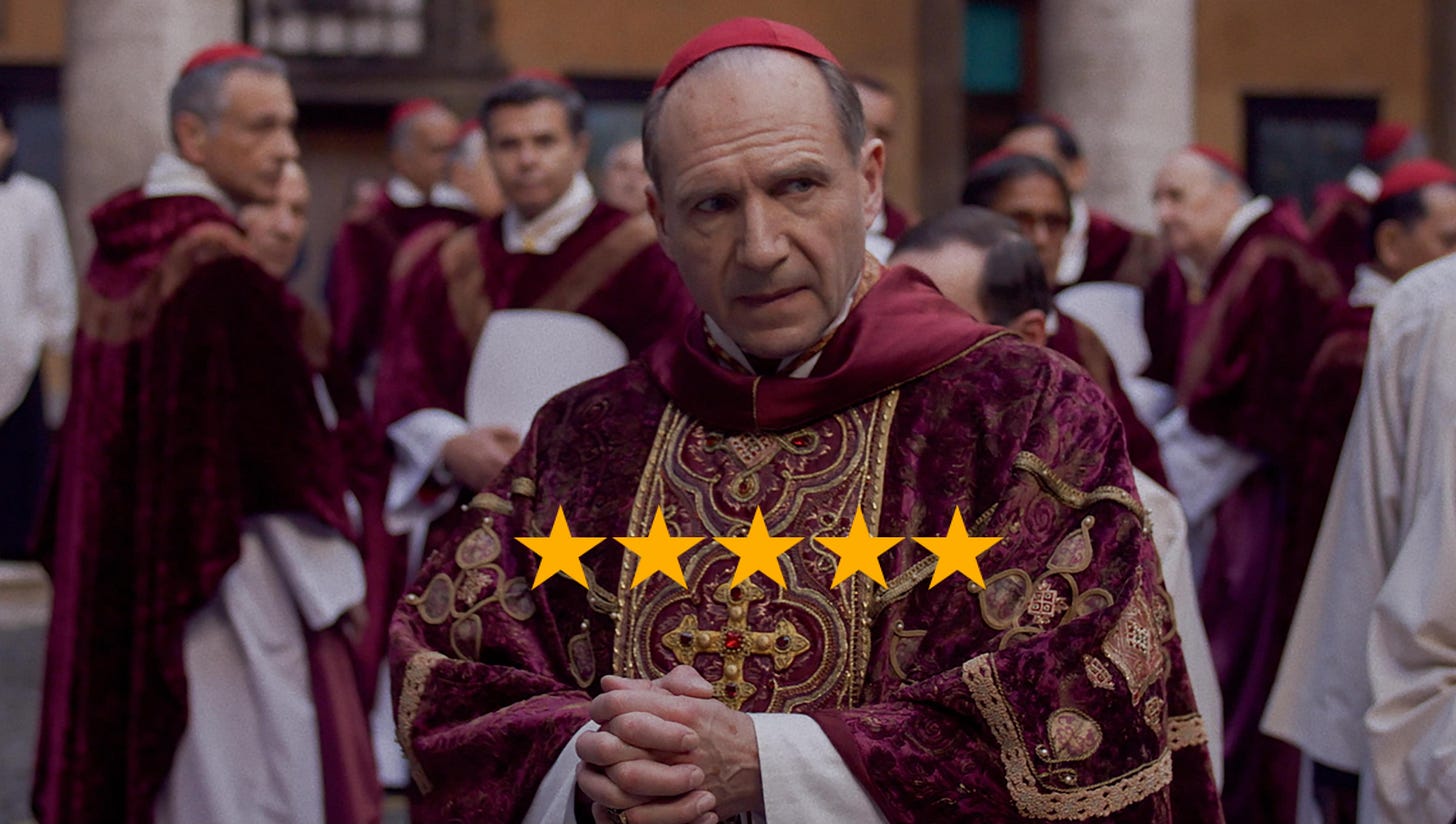Conclave Review - Envy, Pride and Greed fill the Vatican in Tense Story of Papal Succession
Ralph Fiennes stars in Oscar-winning director Edward Berger’s engrossing thriller that sees cardinals compete for the position of Pope during their uneasy Roman holiday.
Conclave, based on a Robert Harris novel by the same name, is much more thrilling than it has any right to be.
As someone who has watched Sidney Lumet’s 1957 classic 12 Angry Men more times than I care to admit, I’m not averse to the ‘people locked in rooms talking’ genre, and Conclave is a great addition to this particular canon. It’s a dialogue-driven, philosophical mystery story presented in the guise of a thriller, complete with a gnawing tension and sound design that would feel at home in a Bourne movie. Tying all of these elements together is a great central performance from Ralph Fiennes as Cardinal Lawrence, the man tasked with overseeing the selection process and keeping the peace among the fiercely competitive clergymen.
The film opens shortly after the Pope’s unexpected death. His Bible is still lying open, and his chess board shows an ongoing match in its endgame, with, perhaps symbolically, all four bishops already removed. With the papacy vacant, eminent cardinals from around the world are summoned to Rome to take part in a conclave - a secret meeting to decide on a successor. Alongside their ceremonial robes and Latin phrasebook, each brings with them a leadership gambit and a dark secret that may de-rail their campaign. Among the candidates are the populist Tedesco (Sergio Castellitto), the ‘reluctant’ Bellini (Stanley Tucci), the traditionalist Adeyemi (Lucian Msamati), the shifty Tremblay (John Lithgow) and the outsider Benitez (Carlos Diehz). They are a group of holy men who have well and truly been lead into temptation. Acting as referee is Cardinal Lawrence, who hopes to find a Pope intellectually flexible enough to embrace uncertainty.
While there are some less engaging scenes, as to be expected given the subject matter, for the most part Conclave expertly bridges the gap between detective drama and genuine thriller.
The foundation of all of this is a fantastic script. The steady drip of information is paced perfectly, plot twists and revelations are well spaced to make sure the narrative never loses momentum. The sound design also plays a key role in setting the tone. While most of the action discussed in the film takes place off screen, with one explosive exception, each new verbal bombshell is accompanied by crashing, reverberating bass notes. Finally, the performances play a part, none more so than Ralph Fiennes’s Cardinal Lawrence. He expertly treads the line between impartial observer, and ambitious puppet master, keeping us guessing when it comes to his true intentions.
The meaning behind Conclave’s action extends far beyond the walls of Rome’s holy city, as the film has a lot to say about modern life.
Most overtly, it’s a critique of elections in general, even if it does take place is a fantasy world in which a candidate’s misconduct actually harms their campaign. Conclave’s characters voice thoughts I’m sure all of us have had in recent years: Why does every candidate have at least one major flaw? Which of these is the least bad option? How will the rest of the world judge us if we elect this person? Cardinal Lawrence warns us of the dangers of electing somebody who projects absolute certainty, and reminds us of the virtues of candidates owning up to past mistakes and using them to grow as people. Plato’s evergreen idea of the reluctant leader, the theory that the person best suited to leadership is also the one who would never seek it out, is a thread that runs throughout the narrative.
Alongside the election action, Conclave enjoys drawing an effective, often subtle, comparison between historic traditions and the modern world. At times, the film uses this juxtaposition to bring some levity to a heavy subject matter. Tedesco punctuating his ‘make Catholicism great again’ speech about traditional values with puffs on an electric vape is a bizarre image, and one that reveals a lot about the eminent cardinal’s character. At other times, this contrast is more jarring. The antiquated religious costume raises questions about how the Church fits into modern society, and Isabella Rossellini’s small, yet powerful cameo forces us to reflect on gender imbalances in our leadership structures.
Conclave is certainly the most gripping story about the Papal election process that I’ve ever seen, and one that leaves you pondering questions about life, faith and leadership long after you’ve left the cinema.
Conclave is now showing at the Curzon, the Vue and the Phoenix Picturehouse.



